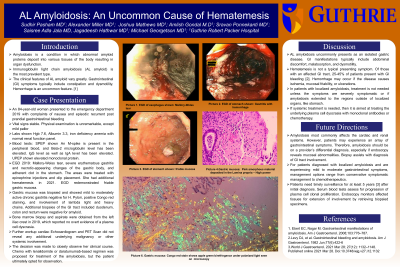Back


Poster Session B - Monday Morning
Category: Stomach
B0721 - AL Amyloidosis: An Uncommon Cause of Hematemesis
Monday, October 24, 2022
10:00 AM – 12:00 PM ET
Location: Crown Ballroom

Has Audio
- SP
Sudhir Pasham, MD
Guthrie Robert Packer Hospital
Sayre, PA
Presenting Author(s)
Sudhir Pasham, MD1, Alexander Miller, MBBS, MD2, Joshua Matthew, MBBS, MD2, Amlish Gondal, MBBS1, Sravan K. Ponnekanti, MD1, Saisree Reddy Adla Jala, MBBS3, Jagadeesh Hathwar, MBBS, MD2, Michael Georgetson, MBBS, MD2
1Guthrie Robert Packer Hospital, Sayre, PA; 2Guthrie RPH, Sayre, PA; 3Suburban Medical Center, Norristown, PA
Introduction: Amyloidosis is a condition in which abnormal amyloid proteins deposit into various tissues of the body resulting in organ dysfunction. Immunoglobulin light chain amyloidosis (AL amyloid) is the most prevalent type. The clinical features of AL amyloid vary greatly. Gastrointestinal (GI) symptoms typically include constipation and dysmotility. Hemorrhage is an uncommon feature.
Case Description/Methods: An 84-year-old woman presented to the emergency department April 2019 with complaints of nausea and intermittent hematemesis. EGD on the day of admission was notable for a Mallory-Weiss tear, severe erythematous gastritis and necrotic-appearing changes of the gastric body, and adherent clot in the stomach. The areas were treated with epinephrine injections and clip placement. Gastric mucosa was biopsied and showed mild to moderately active chronic gastritis, positive congo red staining, and involvement of lambda light and heavy chains. Further biopsies of the GI tract included duodenum and colon and were negative for amyloid. Workup did not reveal any additional underlying malignancy or other systemic involvement. The decision was made to closely observe her clinical course.
She had additional hematemesis in June 2021. EGD redemonstrated friable gastric mucosa. A daratumumab-based regimen was proposed for treatment of the amyloidosis, but the patient ultimately opted for observation.
Discussion: AL amyloidosis uncommonly presents as an isolated gastric disease which causes hematemesis. Of those with an affected GI tract, 25-45% of patients present with GI bleeding . GI manifestations typically include abdominal discomfort, malabsorption, and dysmotility. Hemorrhage may occur if the disease causes ischemia, mucosal friability, or ulcerations. In patients with localized amyloidosis, treatment is not needed unless the symptoms are severely symptomatic or if amyloidosis extended to the regions outside of stomach. If systemic treatment is needed, then it is aimed at treating the underlying plasma cell dyscrasia with monoclonal antibodies or chemotherapy.
Disclosures:
Sudhir Pasham, MD1, Alexander Miller, MBBS, MD2, Joshua Matthew, MBBS, MD2, Amlish Gondal, MBBS1, Sravan K. Ponnekanti, MD1, Saisree Reddy Adla Jala, MBBS3, Jagadeesh Hathwar, MBBS, MD2, Michael Georgetson, MBBS, MD2. B0721 - AL Amyloidosis: An Uncommon Cause of Hematemesis, ACG 2022 Annual Scientific Meeting Abstracts. Charlotte, NC: American College of Gastroenterology.
1Guthrie Robert Packer Hospital, Sayre, PA; 2Guthrie RPH, Sayre, PA; 3Suburban Medical Center, Norristown, PA
Introduction: Amyloidosis is a condition in which abnormal amyloid proteins deposit into various tissues of the body resulting in organ dysfunction. Immunoglobulin light chain amyloidosis (AL amyloid) is the most prevalent type. The clinical features of AL amyloid vary greatly. Gastrointestinal (GI) symptoms typically include constipation and dysmotility. Hemorrhage is an uncommon feature.
Case Description/Methods: An 84-year-old woman presented to the emergency department April 2019 with complaints of nausea and intermittent hematemesis. EGD on the day of admission was notable for a Mallory-Weiss tear, severe erythematous gastritis and necrotic-appearing changes of the gastric body, and adherent clot in the stomach. The areas were treated with epinephrine injections and clip placement. Gastric mucosa was biopsied and showed mild to moderately active chronic gastritis, positive congo red staining, and involvement of lambda light and heavy chains. Further biopsies of the GI tract included duodenum and colon and were negative for amyloid. Workup did not reveal any additional underlying malignancy or other systemic involvement. The decision was made to closely observe her clinical course.
She had additional hematemesis in June 2021. EGD redemonstrated friable gastric mucosa. A daratumumab-based regimen was proposed for treatment of the amyloidosis, but the patient ultimately opted for observation.
Discussion: AL amyloidosis uncommonly presents as an isolated gastric disease which causes hematemesis. Of those with an affected GI tract, 25-45% of patients present with GI bleeding . GI manifestations typically include abdominal discomfort, malabsorption, and dysmotility. Hemorrhage may occur if the disease causes ischemia, mucosal friability, or ulcerations. In patients with localized amyloidosis, treatment is not needed unless the symptoms are severely symptomatic or if amyloidosis extended to the regions outside of stomach. If systemic treatment is needed, then it is aimed at treating the underlying plasma cell dyscrasia with monoclonal antibodies or chemotherapy.
Disclosures:
Sudhir Pasham indicated no relevant financial relationships.
Alexander Miller indicated no relevant financial relationships.
Joshua Matthew indicated no relevant financial relationships.
Amlish Gondal indicated no relevant financial relationships.
Sravan Ponnekanti indicated no relevant financial relationships.
Saisree Reddy Adla Jala indicated no relevant financial relationships.
Jagadeesh Hathwar indicated no relevant financial relationships.
Michael Georgetson indicated no relevant financial relationships.
Sudhir Pasham, MD1, Alexander Miller, MBBS, MD2, Joshua Matthew, MBBS, MD2, Amlish Gondal, MBBS1, Sravan K. Ponnekanti, MD1, Saisree Reddy Adla Jala, MBBS3, Jagadeesh Hathwar, MBBS, MD2, Michael Georgetson, MBBS, MD2. B0721 - AL Amyloidosis: An Uncommon Cause of Hematemesis, ACG 2022 Annual Scientific Meeting Abstracts. Charlotte, NC: American College of Gastroenterology.

